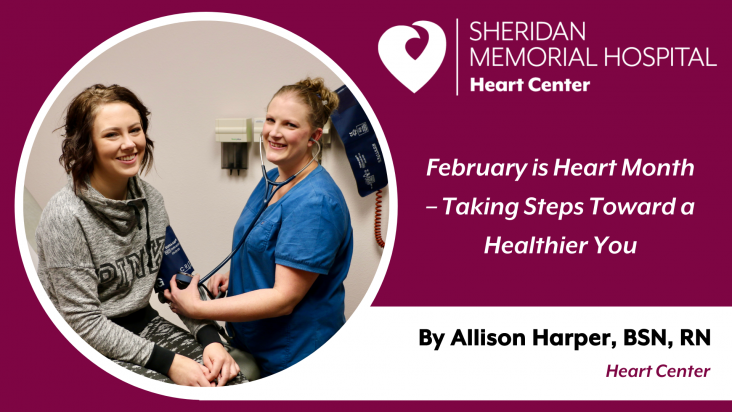By Allison Harper, BSN, RN – Registered Nurse at Sheridan Memorial Hospital’s Heart Center
On average, Americans spend $27.4 billion each year on Valentine’s Day, and $1.8 billion is for candy, with 58 million pounds being chocolate. Although many people associate Valentine’s Day with February, most do not realize that national Heart Health Month also occurs in February. In December 1963, President Lyndon B. Johnson declared February 1964 as the first American Heart Health Month. He urged “the people of the United States to give heed to the nationwide problem of heart and blood-vessel diseases, and to support the programs required to bring about its solution.” This February marks the 58th consecutive year in celebrating American Heart Health Month.
Throughout these ensuing years, public, private, and governmental organizations have worked on programs and initiatives to reduce the risk of heart attack and stroke. Currently, approximately 647,000 Americans die each year from heart and blood vessel disease, continuing to make this the number one cause of death. The yearly cost of heart disease in the form of healthcare services, medicines, and lost productivity due to death is $363 billion.
There are many factors that contribute to the development of heart disease, including advanced age (65 years old and over), gender (males tend to have earlier heart attacks than women), genetics, smoking, low physical activity, being overweight or obese, stress, alcohol, poor diet, and particular disease processes (such as diabetes), high blood pressure, and high cholesterol.
Symptoms to watch for that are suggestive of heart disease are fatigue with simple activities, decreased appetite, heartburn-like symptoms (especially with exertion), gradual shortness of breath, or swelling in your legs. If you experience these symptoms, talk with your doctor to discuss these concerns. Symptoms that start suddenly and do not go away quickly may include: shortness of breath, tightness or a squeezing sensation in the chest, nausea, vomiting, jaw or back pain, left arm pain, sudden vision loss or blurry vision, inability to speak, profuse sweating, and/or sudden dizziness. Early and prompt evaluation of these symptoms is critical! The emergency room nearest to you is the most appropriate place to start if you are experiencing any of these symptoms.
Management of heart disease starts with lifestyle changes. Becoming more physically active and eating healthier is a great starting point. Challenge yourself to start walking at least 30-45 minutes each day. Educate yourself on reading food labels and become aware of hidden added sodium content. Consider monitoring your blood pressure and pulse routinely. Technology can be your friend! Many smartphones, watches, and other wearable trackers have the capability to help you monitor this. Manage your stress levels. Don’t be afraid to practice mindfulness or meditation to help decrease your stress.
Quit tobacco. Ask your doctor for help if you have difficulty quitting on your own. Nicotine hardens the arteries over time, making them less flexible, thus increasing your chance of plaque buildup.
Over time, the plaque can break off or crack the artery wall, causing it to bleed and creating a blood clot that will partially or completely obstruct your artery. When this happens, the blood flow ceases, and the heart becomes “irritated” due to the lack of blood supply. It is at this point when a myocardial infarction (aka heart attack) begins. TIME IS TISSUE! The earlier you are evaluated, the sooner treatment begins in re-establishing blood flow to the heart, and the smaller the amount of irreversible heart muscle death occurs.
What can you do? Be proactive! Make an appointment with your primary care provider to discuss your chances of developing heart disease and what you can do to decrease your risk. Medications may be prescribed to help lower your cholesterol levels, decreasing the amount of plaque buildup. Blood pressure medications may also be added to your regimen. This will reduce the workload on your heart, allowing it not to strain or work as hard to pump out the blood efficiently throughout your body.
Heart Health Month kicks off on February 4th with National Wear Red Day, raising awareness of heart disease in women. February 13th – 19th is National Heart Failure Awareness Week.
Sheridan Memorial Hospital will be offering a free blood pressure check drive-up event on February 22nd from 9:00 am – 11:00 am in the employee parking lot just north of the hospital. Staff will be on hand to provide information on improving your health, administer blood pressure checks and answer your questions.
Challenge yourself, and have your new year’s resolution include taking the first step toward a healthier you this year. Your heart will thank you.
Click here to find out more about the Free Blood Pressure Screening on February 22nd. Or call Sheridan Memorial Hospital’s Internal Medicine at 307.675.2620 to schedule an appointment with a provider.

